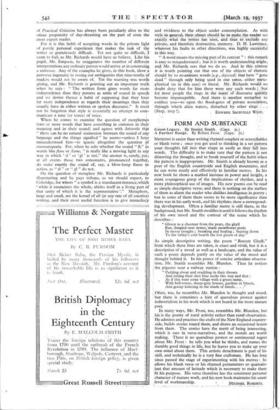- FORM AND SUBSTANCE
Gieen Legacy. By Stanley Snaith. (Cape. 5s.) A Further Ratige_ . By Robert FrOst. (Cape. 5i.)
Noramo is easier than writing rhymed couplets or octosyllables or blank verse ; once you get used to thinking in a set pattern your' thoughts fall into that shape as easily as they fail into wdrds. The difficulty is to make sure that the pattern IS not distorting the thought, and to break yourself of the habit:When the pattern is inappropriate. Mr. Snaith is already known as a
poet of the English countryside and English mountains, and he can write neatly and effectively in familiar metres. In his new book he shows a marked increase in .power and insight; a more courageous grasp of the implications of rhythm, and a more philosophical use of images. His new poems can be read as' simple descriptive verse, and there is nothing on the. surface
of them .to alarm the reader who dislikes intelligence- in poetry ; but in some of them there seems to be more significance than there was in his early work, and his rhythms show a correspond-
ing development. Often a familiar metre is still there, in the background, but Mr. Snaith modifies it until it follows the rhythm
, of his own 'mood and the contour or Ike -scene- which lie ; describes :
Glossy as a chestnut from the peats the ghyll Ran, dangled over stones 'made snoWflower pools In mossy troughs ; breaking and healing ; bearing down To the valley's cold hearth the lost gleam of day."
• As 'simple descriptive writing, the poem " Rossett Ghyll," froth which these lines are taken, is exact and vivid, but it is a description of a mood as well as a landscape, and the value of such a poem depends partly on the value of the mood and thought behind it. In his power of concise-articulate observa- tion, Mr. Snaith resembles Mr. Blunden. Thus he notices the pigeons near a railway station : "Padding about and crudding in their throats And jetting their shot blue necks this way and that : • As if this were some village with a green name, With bell-tower, sheep-grey houses, gardens in bloom, And gossip loitering in the shade of lintels:. . ."
, Often, too, he resembles Mr.. Blunden in thought and mood, • but there is sometimes a hint of querulous protest against industrialism in his work which is not heard in the more mature poet.
In many ways, Mr. Frost, too, resembles Mn. Blunden, but his is the poetry of rural activity rather than rural observation. He admires and practises the crafts of the New England country- side, builds stories round them, and draws an occasional lesion from them. The stories have the merit of being interesting, which is rare in verse-narratives, and the morals are worth making. There is no querulous protest or sentimental regret abOut Mr. Frost : he tells you what he thinks, and names the durable good things in life, but he leaves you to make up your , own mind about them. This artistic detachment is part of his skill, and technically he is a very fine craftsman. He has long since passed the stage of experimenting with his metres :. he allows his blank verse or his rhymed pentameters or quatrains just that amount of latitude which is necessary to make them fit his purpose. His verse therefore has the consistent personal character of mature work, and his new book maintains his usual




































































 Previous page
Previous page